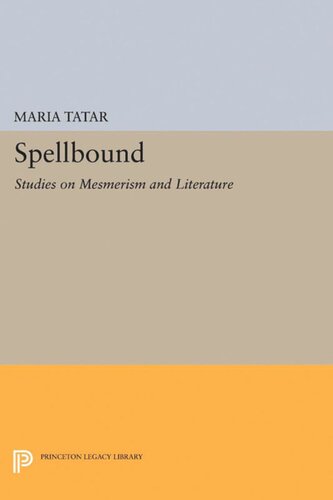

Most ebook files are in PDF format, so you can easily read them using various software such as Foxit Reader or directly on the Google Chrome browser.
Some ebook files are released by publishers in other formats such as .awz, .mobi, .epub, .fb2, etc. You may need to install specific software to read these formats on mobile/PC, such as Calibre.
Please read the tutorial at this link: https://ebookbell.com/faq
We offer FREE conversion to the popular formats you request; however, this may take some time. Therefore, right after payment, please email us, and we will try to provide the service as quickly as possible.
For some exceptional file formats or broken links (if any), please refrain from opening any disputes. Instead, email us first, and we will try to assist within a maximum of 6 hours.
EbookBell Team

4.4
92 reviewsFranz Anton Mesmer's concept of animal magnetism exercised a profound influence on key European and American thinkers. Mesmer, who saw in his discovery the secret of health, had hoped to recover the harmony between man and nature by harnessing the power of magnetic fluids. In calling attention to the existence of a second self that surfaces in the hypnotic trance, Mesmer made his real contribution and took the first, decisive steps on the road leading to the unconscious. While most critical studies of mesmerism originate in the history of science or medicine, Maria Tatar's book takes a fresh approach by tracing the impact of mesmerism on literature.
The author launches her account with a portrait of Mesmer and places his views in the context of eighteenth-century thought. She then explores the significance of Mesmer's ideas and studies their influence on nineteenth-century German, French, and American writers. In conclusion, she examines the ways in which modern authors absorbed and reshaped the mesmerist legacy bequeathed to them by earlier generations.
Whether discussing the electrical energy vibrating through Kleist's dramas, the electrical heat radiating from Hoffmann's figures, the streams of magnetic fluid coursing through Balzac's novels, or the magnetic chain of humanity linking Hawthorne's characters, Professor Tatar recaptures the meaning of ideas, motifs, and metaphors often overlooked by literary critics. Her study illuminates, in a remarkable way, the subtle connections between science, psychology, and literature.
Originally published in 1978.
The Princeton Legacy Library uses the latest print-on-demand technology to again make available previously out-of-print books from the distinguished backlist of Princeton University Press. These editions preserve the original texts of these important books while presenting them in durable paperback and hardcover editions. The goal of the Princeton Legacy Library is to vastly increase access to the rich scholarly heritage found in the thousands of books published by Princeton University Press since its founding in 1905.